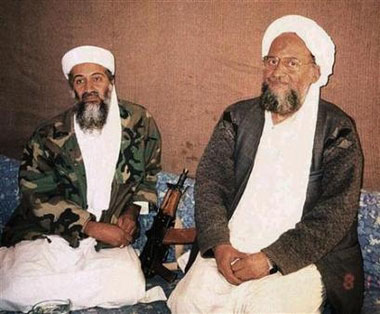
Osama bin Laden (L) sits with his deputy Ayman
al-Zawahri in this file photo image supplied by the Dawn newspaper on
November 10, 2001. Suddenly, the faces and voices of bin Laden and Zawahri
are everywhere, in a stream of video and audio messages broadcast to the
world. [Reuters] |
Suddenly, the faces and voices of al Qaeda leader Osama bin Laden and his
deputy Ayman al-Zawahri are everywhere, in a stream of video and audio messages
broadcast to the world.
In the past month alone, six new tapes from the two have reached an
international audience. Excerpts of Zawahri's latest message were broadcast on
Al Jazeera television on Thursday, a day before the first anniversary of the
London bombings.
But U.S. officials and terrorism experts are wary of concluding that the
spate of messages means another major attack is imminent.
Instead, they believe a complicated mix of factors is behind the outpouring:
a desire to show that al Qaeda is still potent; a new sophistication in the use
of propaganda, and finally, sheer coincidence as several different messages have
all surfaced within a short time span.
US officials and terrorism experts said they take al Qaeda's threats
seriously. The two men are believed to be hiding somewhere in the hostile,
tribal border area between Pakistan and Afghanistan.
Bin Laden was not heard from for a year prior to January 2006. But he and
Zawahri have now issued 11 audio and video tapes this year, the highest
frequency recorded since the September 11 attacks, analysts say.
"They are trying to prove that the movement's not dead," said Kenneth
Katzman, a terrorism analyst at the Congressional Research Service, the in-house
think tank of Congress.
The two leaders may have felt they had to respond quickly to last month's US
military success in killing Abu Musab al-Zarqawi, the leader of al Qaeda in
Iraq.
A failed US attempt to kill Zawahri in January and possible greater ease of
movement for al Qaeda leaders in Pakistan's northwest frontier region might have
also contributed to the higher volume of tapes, Katzman said.
Ben Venzke, head of intelligence company IntelCenter whose clients include
the US government, said the back-to-back timing of the messages did not mean
they were actually designed to produce a threatening crescendo.
"Does this correlate to any kind of future attacks? I think it doesn't lend
itself to an easy yes or no," he said, although certain elements of past
messages such as references to US territory could indicate an increased
likelihood of a future attack.
Venzke saw some of the tapes as a quick al Qaeda response to major events,
such as the death of Zarqawi. Others were more general commentaries on current
events which were issued when they were ready. Still others were anniversary
features issued to mark the date of a past attack.
Growing Media Savvy
In part, experts traced the recent wave of messages to al Qaeda's increasing
media savvy and better logistics.
"It's a result of their ongoing propaganda efforts which have become even
more sophisticated," a US counterterrorism official said. "It demonstrates that
they've greased the wheels. They've gotten better at this with time."
Coupled with its growing production expertise, al Qaeda leaders have
increasingly felt compelled to reassure followers after setbacks while claiming
credit for events that seem favorable to their cause.
"Bin Laden and Zawahri are trying to piggy-back on events they consider
favorable, such as the Taliban resurgence, the upsurge of Islamic militants in
Pakistan, the takeover by the Islamic Courts Union in Somalia. By coming out
with this many videos, they are trying to give the impression that 'this is
because of us,"' Katzman said.
Gen. Russ Howard, an Army terrorism expert who retired last year, said al
Qaeda might be trying to debunk US assertions that the organization was losing
central control of its supporters to local or "homegrown" Islamic militants who
operate independently.
"This may be a bit of propaganda asserting that there is some type of central
control -- that maybe we have this all wrong," Howard said. "It may be a way of
telling those franchise groups or wannabe groups that al Qaeda is still in the
game, even despite the killing of Zarqawi."